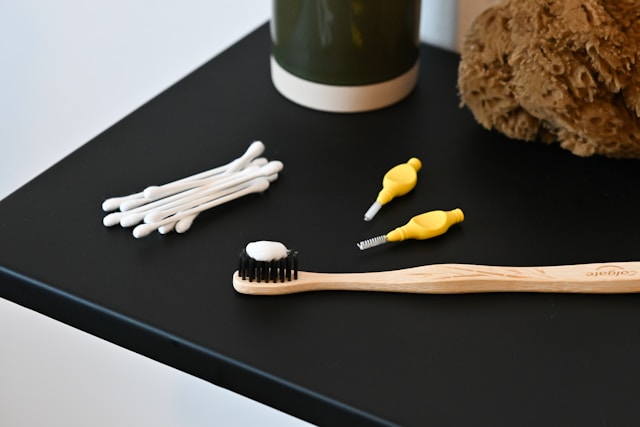A healthy smile speaks volumes about a person’s overall well-being. The condition of your teeth and gums affects more than appearance; it influences digestion, speech, and confidence. Good oral care habits go far beyond brushing once or twice a day. They require consistency, awareness, and a thoughtful approach to daily routines. From choosing the right products to adopting mindful eating habits, every step plays a part in keeping your mouth in top condition.
The following six tips provide a practical path toward achieving and maintaining excellent oral health.

Choose Smart Toothpaste Alternatives
Toothpaste tablets have become a fresh and eco-conscious approach to oral hygiene. They come in small, chewable forms that release cleaning ingredients once bitten, producing a gentle foam that polishes teeth and helps remove plaque.
What makes them appealing is their convenience for travel, reduced packaging waste, and precise dosage that prevents overuse. Many users appreciate their compact design, which saves space and avoids spills from traditional tubes. For a detailed look at how they compare to regular toothpaste, you can explore this link, which explains their ingredients, effectiveness, and environmental advantages. Using toothpaste tablets can bring a modern twist to your brushing routine while keeping performance high and waste low.
Brush with Care and Consistency
Good brushing habits start with technique rather than speed or pressure. The motion of your brush should be gentle and circular, reaching the gumline and the back molars where food tends to collect. Two minutes per session, twice a day, is the recommended standard for effective cleaning.
Choosing a soft-bristled brush can prevent gum irritation, and replacing it every three months keeps it effective. Electric toothbrushes often provide timers and pressure sensors that guide better habits, but a manual brush works just as well when used properly.
Small, intentional actions during brushing can prevent plaque buildup, gum recession, and surface stains. The consistency of your effort is what maintains a bright and healthy mouth.
Floss Daily to Remove Hidden Debris
Flossing reaches areas that brushing alone cannot touch. Food particles often lodge between teeth, feeding bacteria that can lead to decay and gum inflammation. Traditional floss, floss picks, and water flossers all serve the same goal – removing hidden residue and disrupting bacterial colonies.
The technique should be gentle yet thorough, moving the floss in a C-shape around each tooth and below the gumline. Once a day is sufficient for most people, preferably before bedtime when the mouth is at rest for several hours.
Regular flossing freshens breath and maintains gum strength, preventing the onset of gingivitis. Over time, it creates a noticeable difference in how clean your mouth feels.
Balance Your Diet for Strong Teeth
What you eat directly influences your oral health. A diet rich in calcium, phosphorus, and vitamins supports strong enamel and healthy gums. Foods such as leafy greens, cheese, nuts, and yogurt provide essential minerals that rebuild enamel and maintain bone density.
Crunchy fruits and vegetables like apples and carrots stimulate saliva production, which neutralizes acids and washes away food debris. Limiting sugary snacks and acidic beverages can reduce erosion and prevent cavities from forming.
Drinking plenty of water after meals helps cleanse the mouth naturally, maintaining a balanced environment for beneficial bacteria. By keeping your diet nutrient-rich and low in refined sugars, you can protect your teeth from within and sustain a resilient smile.
Visit Your Dentist Regularly

Routine dental visits are an important part of preventive care. Professional cleanings remove tartar that brushing and flossing cannot eliminate. Dentists can identify early signs of decay, gum disease, or enamel erosion before they become severe.
These appointments offer more than just cleaning; they provide guidance tailored to your habits and needs. Whether it’s advice on better brushing methods, product recommendations, or monitoring of orthodontic concerns, these visits support long-term oral wellness.
Most dental professionals suggest a check-up every six months, but individual schedules may vary based on personal history and treatment requirements. Keeping these appointments not only protects your teeth but also builds a lasting partnership in health maintenance.
Protect Your Teeth from Harmful Habits
Daily routines sometimes include habits that slowly harm dental health. Biting nails, chewing on pens, grinding teeth, or opening packages with your teeth can wear down enamel and strain the jaw. Using a mouthguard during sleep can help prevent grinding damage, especially under stress.
Reducing sugary drinks and tobacco use also preserves enamel color and prevents dry mouth, which encourages bacterial growth. Hydration plays a major role in protecting your mouth; saliva acts as a natural defense against acids.
When you treat your teeth with care, you avoid cumulative damage that might otherwise require complex treatment later. Simple awareness can go a long way in preserving the natural strength of your teeth.
Perfect oral health is the result of consistent, informed care rather than occasional effort. The combination of mindful brushing, daily flossing, balanced nutrition, professional supervision, and protective habits creates a foundation for lasting strength and beauty. With regular attention and care, maintaining perfect oral health becomes not just a goal but a lifelong standard worth keeping.


